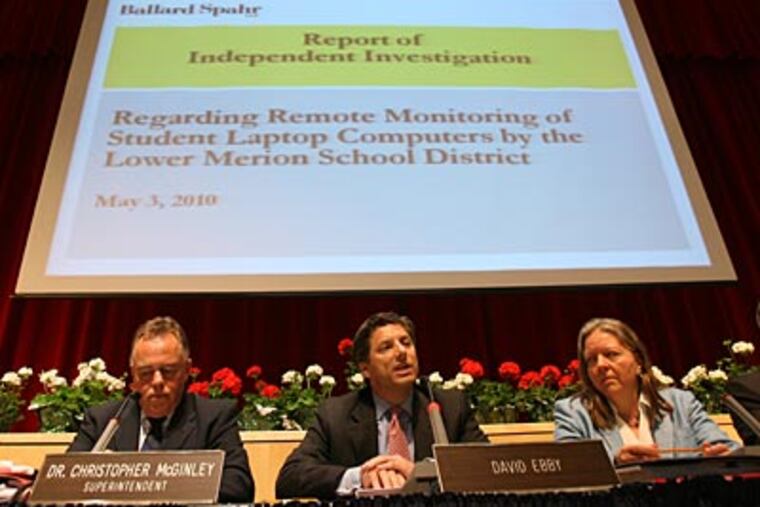Lower Merion adopts new policies on laptop tracking
The Lower Merion School District on Monday adopted a new set of policies to govern the use and tracking of student laptops and other technology, its latest step to get past the furor of webcam monitoring.

The Lower Merion School District on Monday adopted a new set of policies to govern the use and tracking of student laptops and other technology, its latest step to get past the furor of webcam monitoring.
The measures, passed unanimously by the school board at its monthly meeting, spell out in detail when, how, and for what reasons school officials can access or monitor the laptops they will give to each of the district's nearly 2,300 high school students next month.
The measures require students and their parents to acknowledge the policies and consent in writing to any tracking, or give them an option to not participate in the laptop program. They also mandate expanded training about privacy and technology for teachers and staff, and will include information sessions for parents.
The new policies, recommended by a task force of students, parents, administrators, and community members, met one of the provisions of a federal court injunction signed in May by U.S. District Judge Jan E. DuBois. Besides banning any unauthorized webcam monitoring, the judge ordered the district to enact expansive, transparent policies before the school year opens in September.
A team of investigators hired earlier this year by Lower Merion had cited a lack of clear district policies as one reason for the now-infamous and potentially costly uproar over its practice of secretly tracking student laptops.
The meeting, at Penn Valley Elementary School, drew barely a dozen community members, and none who asked to speak about the policy.
In a statement, district officials praised the changes and said they were intended to safeguard the students while enabling Lower Merion to continue its program of giving computers to every student.
"We are committed to restoring the community's trust and continuing to provide our students with a top-notch education," superintendent Christopher McGinley said.
One policy requires the superintendent to devise and implement new procedures and establish staff training on the use and access of student laptops. Another says school employees will remotely access a student laptop only with written consent from students and/or their parents or guardians.
A third policy outlines students' responsibility for caring for their laptops and requires the superintendent to clearly spell out the mandated deposit and insurance fees for the equipment.
A fourth policy outlines a "laptop responsibility tree," identifying the roles and authority that district administrators, teachers, and technicians have in maintaining and supervising the students' use of laptops. And a fifth policy dictates students' rights and responsibilities when using district technology, including accessing its internal network and the Internet.
The district plans to begin mailing the policies and forms to students' households this week, officials said. Teachers will be training on the new policies later this month.
Lower Merion has acknowledged that at least 40 high school students were inadvertently photographed by their laptop webcams in the last two years - typically after reporting their computers lost or stolen - but has said its internal investigation found no evidence of spying.
The injunction stemmed from a lawsuit filed by Harriton High School student Blake Robbins, who accused the suburban district of secretly spying on students. Robbins and his parents contend that the district violated their privacy by capturing hundreds of webcam photos last fall, including images of the teen and his family in their Penn Valley home. His lawsuit remains unresolved.
A second student, Jalil Hasan, a recent graduate of Lower Merion High School, filed a similar suit in July.
The district has already spent nearly $1 million in legal fees and expenses on the case.
Meanwhile, the Robbinses' attorney has asked the judge to order Lower Merion to pay him $418,000 to cover his bills through July. That request is pending.